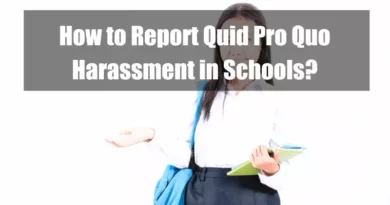Legal Consequences of Quid Pro Quo Harassment
Takeaways
| Key Points |
|---|
| The legal consequences of quid pro quo sexual harassment for both individuals and employers can be significant. Individuals found guilty may face disciplinary actions, including termination, suspension, or demotion, and can be held personally liable for damages such as compensation for emotional distress, lost wages, and legal fees. In some cases, criminal charges may be brought against the perpetrator. |
| Employers may also be held liable, especially if they knew or should have known about the harassment and failed to take corrective action. This liability can lead to civil penalties, including compensation for lost wages, emotional distress, punitive damages, and financial penalties. |
| Title VII of the Civil Rights Act of 1964 classifies quid pro quo harassment as a form of sex discrimination, barring employers from conditioning job benefits on sexual favors. This law extends to California, where the Fair Employment and Housing Act (FEHA) of 1959 provides additional protections, prohibiting discrimination based on categories such as sex, race, disability, and more. |
| FEHA offers remedies, including attorney fees, expense reimbursement, and punitive damages for victims, and allows them to file complaints with the California Department of Fair Employment and Housing or pursue legal action in court. |
Infographic

Introduction
Quid pro quo sexual harassment occurs when an individual in a position of authority demands sexual favors in exchange for job-related benefits such as promotions, raises, or continued employment. Failure to comply with these demands can lead to adverse employment actions, such as termination, demotion, or withheld opportunities. This type of harassment carries significant legal consequences for both the individual committing the harassment and the employer, particularly if they fail to take corrective action.
Consequences for Individuals
Individuals found guilty of quid pro quo sexual harassment face a range of legal and professional consequences. These may include disciplinary actions by their employer, such as suspension, demotion, or outright termination. Additionally, individuals can be held personally liable for the harassment, which means they may be required to compensate the victim for damages such as lost wages, emotional distress, and legal fees. In some cases, where the harassment involves assault or coercion, the perpetrator could face criminal charges under relevant state and federal laws.
Consequences for Employers
Employers also face severe legal ramifications if quid pro quo harassment occurs in their organization, especially if they were aware of it or failed to address it. Title VII of the Civil Rights Act of 1964 obligates employers to prevent and address harassment in the workplace. Failure to meet this obligation can result in civil penalties, including compensating the victim for lost wages, emotional distress, and punitive damages.
Even if an employer takes action to address harassment, they may still be held liable if the action is deemed insufficient or if the harassment creates a hostile work environment. Under Title VII of the Civil Rights Act of 1964, employers are legally required to maintain a workplace free from harassment. Failure to meet this obligation can result in legal action, financial penalties, and reputational harm. Additionally, businesses that do not take adequate measures to prevent or address harassment may suffer negative public relations, employee dissatisfaction, or protests, all of which can significantly damage a company’s reputation and operations.
Legal Framework for Quid Pro Quo Sexual Harassment
The legal framework for quid pro quo sexual harassment in the United States is governed primarily by federal law under Title VII of the Civil Rights Act of 1964 and state-specific laws such as the California Fair Employment and Housing Act (FEHA). These laws protect employees and may impose serious penalties on individuals and employers who engage in or tolerate quid pro quo harassment.
Title VII of the Civil Rights Act of 1964
At the federal level, Title VII of the Civil Rights Act of 1964 prohibits employers from discriminating based on sex, race, color, national origin, or religion. Under this law, quid pro quo sexual harassment is a form of sex discrimination. It occurs when an individual in a position of authority, such as a supervisor or manager, demands sexual favors in exchange for job benefits. Failing to meet these demands can lead to negative employment actions such as termination or demotion, which are clear violations of Title VII.
The Equal Employment Opportunity Commission (EEOC) enforces Title VII and investigates complaints of quid pro quo sexual harassment. The EEOC has clear guidelines that outline what constitutes quid pro quo harassment and hold employers responsible for addressing it. If a supervisor or manager leverages their authority to solicit sexual favors, the employer is generally held liable unless they can demonstrate that they took reasonable and adequate steps to prevent harassment, such as implementing effective anti-harassment policies and promptly addressing any complaints.
California Fair Employment and Housing Act of 1959 (FEHA)
States often supplement federal protections with their own legislation. California’s Fair Employment and Housing Act (FEHA) provides broader protections against workplace harassment, including quid pro quo harassment, than federal Title VII, as it covers smaller employers. FEHA prohibits discrimination based on categories such as sex, race, religion, marital status, disability, and age. It specifically bans quid pro quo harassment and allows victims to pursue legal recourse through the California Department of Fair Employment and Housing (DFEH).
A significant aspect of FEHA is that it permits punitive damages to be imposed on corporate defendants if harassment is found to involve corporate officers or if an employer’s actions or inactions are particularly negligent. Additionally, FEHA provides for the recovery of attorney fees and expenses for victims who prevail in court, which can add a substantial financial burden on employers who fail to prevent harassment.
Seeking Compensation and Legal Recourse
Victims of quid pro quo sexual harassment have several legal options to seek compensation. Depending on the circumstances of the case, they may be entitled to economic damages such as lost wages or benefits, emotional damages for pain and suffering, and punitive damages aimed at penalizing the employer or individual harasser for egregious conduct.
In many cases, a successful lawsuit can result in the victim being reinstated to their former position or being compensated for missed job opportunities. Victims can file complaints with federal or state agencies, such as the EEOC or California’s Department of Fair Employment and Housing (DFEH), which will investigate claims and may initiate legal action on behalf of the victim.
Victims are encouraged to seek legal advice from employment attorneys, who can help them navigate the complex legal system and assess the strength of their case. Attorneys can also help victims negotiate settlements with employers or, if necessary, represent them in court.
Conclusion
- Quid pro quo sexual harassment carries serious legal consequences for both individuals and employers.
- Individuals who commit harassment may face personal liability, disciplinary action, and criminal charges in more severe cases.
- On the other hand, employers must take proactive steps to prevent and address harassment in the workplace or risk civil penalties, reputational harm, and workplace disruptions.
- The legal framework, including Title VII and FEHA, provides strong protections for victims and imposes significant penalties for violations.
- By adhering to these laws and creating a harassment-free workplace, employers can protect both their employees and their businesses from the damaging effects of quid pro quo sexual harassment.
FAQ
What legal frameworks address quid pro quo harassment in the U.S.?
In the United States, quid pro quo harassment is prohibited under Title VII of the Civil Rights Act of 1964, which bans employment discrimination based on sex. The Equal Employment Opportunity Commission (EEOC) enforces these provisions, and many states have additional laws offering further protections.
What are the legal consequences for employers liable for quid pro quo harassment?
Employers can face significant legal consequences, including compensatory damages for the victim (such as back pay and emotional distress), punitive damages, and legal fees. Additionally, employers may suffer reputational damage, leading to decreased employee morale and productivity.
How is employer liability determined in quid pro quo harassment cases?
Employers are generally held strictly liable for quid pro quo harassment committed by supervisors or agents, as these individuals are considered acting on the employer’s behalf. This means that if a supervisor engages in quid pro quo harassment, the employer is typically liable, regardless of whether they were aware of the conduct.
What are the potential legal consequences for employees who commit quid pro quo harassment?
Employees who engage in quid pro quo harassment may face disciplinary actions from their employer, including suspension or termination. They can also be held personally liable in civil lawsuits, potentially resulting in financial penalties and reputational damage. In severe cases, criminal charges may be pursued.
What must a plaintiff prove to establish a quid pro quo harassment claim?
A plaintiff must demonstrate that: (1) they were an employee or applicant of the defendant; (2) the harasser made unwelcome sexual advances or engaged in other unwanted conduct of a sexual nature; (3) employment benefits were conditioned on accepting the harasser’s advances, or employment decisions were based on acceptance or rejection of such conduct; (4) the harasser was a supervisor or agent of the employer; (5) the plaintiff was harmed; and (6) the harasser’s conduct was a substantial factor in causing the harm.
What remedies are available to victims of quid pro quo harassment?
Victims may be entitled to remedies such as reinstatement to their position, back pay, compensatory damages for emotional distress, and punitive damages if the employer acted with malice or reckless indifference. Courts may also order employers to implement or revise anti-harassment policies and training programs.
Can an employer defend against a quid pro quo harassment claim?
Employers have limited defenses in quid pro quo cases due to strict liability. However, they may argue that the alleged harassment did not occur, that the employment actions were based on legitimate, non-discriminatory reasons, or that the plaintiff unreasonably failed to take advantage of preventive or corrective opportunities provided by the employer.
What is the statute of limitations for filing a quid pro quo harassment claim?
Under federal law, a charge must be filed with the EEOC within 180 days of the alleged harassment. This period may be extended to 300 days if a state or local agency enforces a law prohibiting employment discrimination on the same basis. State laws may have different filing deadlines.
How does quid pro quo harassment differ from hostile work environment harassment?
Quid pro quo harassment involves explicit or implicit demands for sexual favors in exchange for employment benefits, typically by someone in authority. In contrast, a hostile work environment arises when unwelcome conduct of a sexual nature is so severe or pervasive that it creates an intimidating, hostile, or offensive work environment, regardless of the harasser’s position.
Can an employee be retaliated against for reporting quid pro quo harassment?
Retaliation against an employee for reporting harassment is illegal under Title VII. Employees who experience retaliation can file a separate claim against their employer, potentially leading to additional damages and penalties for the employer.
Are employers required to have policies addressing quid pro quo harassment?
While not explicitly mandated by federal law, employers are strongly encouraged to implement comprehensive anti-harassment policies and training programs. Doing so can help prevent harassment and may serve as a defense in certain cases.
Can quid pro quo harassment occur outside of the workplace?
Yes, quid pro quo harassment can occur in any setting where there is a power imbalance, such as educational institutions. For example, in Alexander v. Yale, the court recognized that sexual harassment of students by faculty could constitute sex discrimination under Title IX.
What role does the Equal Employment Opportunity Commission (EEOC) play in quid pro quo harassment cases?
The EEOC enforces federal laws prohibiting employment discrimination, including quid pro quo harassment. It investigates charges, facilitates mediation, and may file lawsuits on behalf of victims. The EEOC also provides guidance to employers and employees on preventing and addressing harassment.
What impact does a successful quid pro quo harassment claim have on an employer’s operations?
Beyond legal and financial consequences, a successful claim can lead to increased scrutiny from regulatory agencies, necessitate workplace policies and training changes, and damage the organization’s reputation. This can affect employee morale, productivity, and the ability to attract and retain talent.







